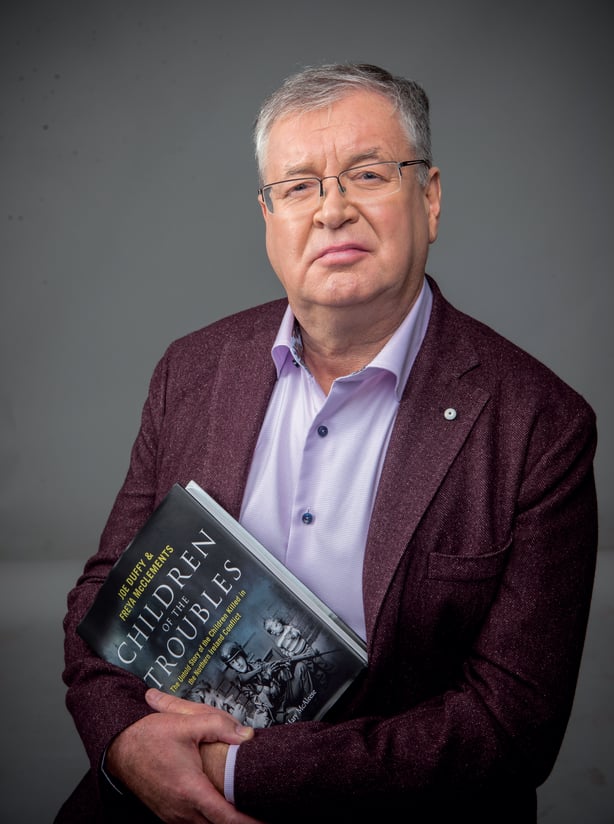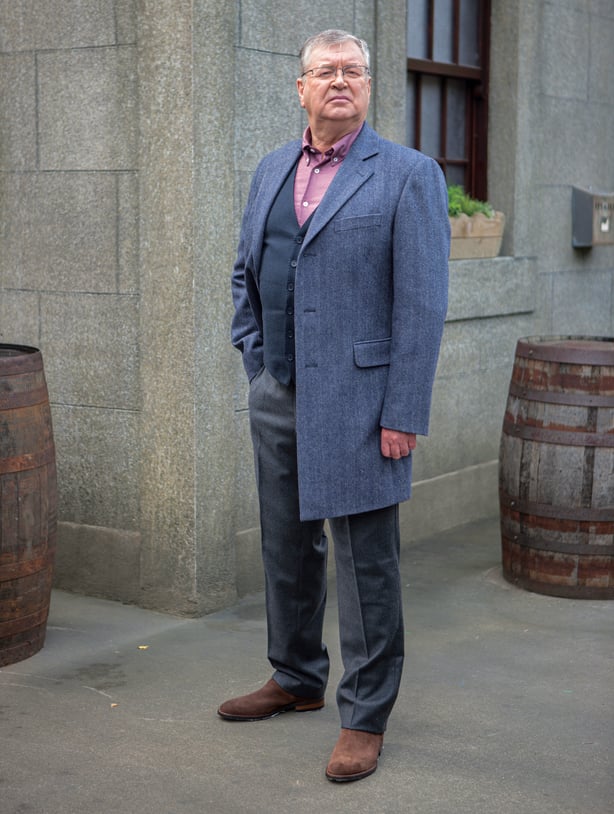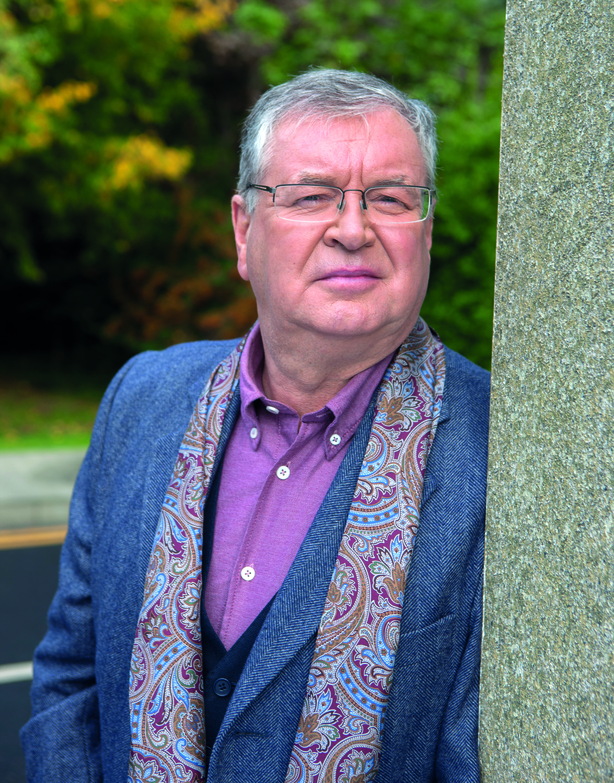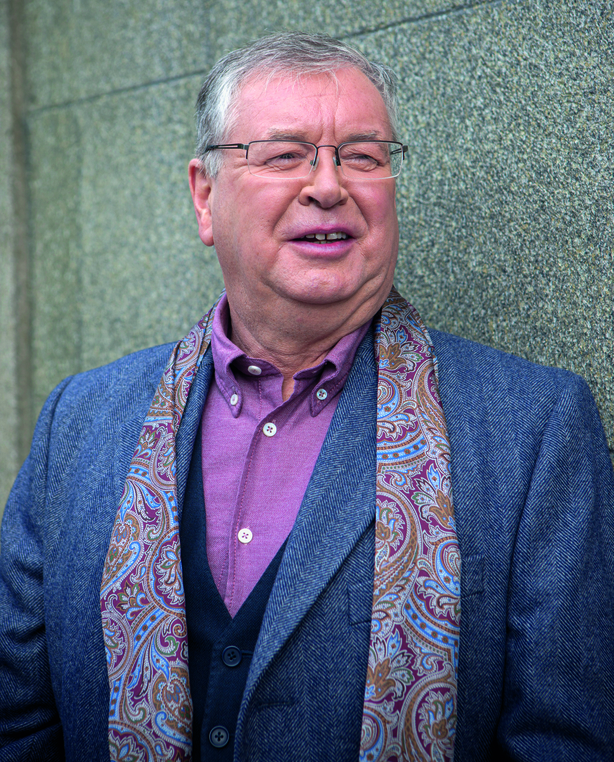As his new book, Children of the Troubles, is released, Joe Duffy tells Janice Butler why it was so difficult to complete, why he's in no rush to retire and his obsession with history.
It’s the day after Budget day when I meet Joe Duffy in the RTÉ radio centre and it’s all go. I walk into a dazzle of flashing cameras and journalists shouting questions at Minister Paschal Donohoe, just out of his grilling by members of the public on the Sean O’Rourke show. It’s a scene straight out of a movie. I take shelter in an office away from the madness to wait for Joe. He arrives a couple of minutes late, but is extremely apologetic about this and proceeds to tell the most Joe Duffy story imaginable.
He was stuck at the East Link toll bridge with the traffic not moving, so he rang the Dublin City Traffic phoneline –something I didn’t even know existed. He got the reason for the traffic, a crash up ahead, and got out to tell other stationary drivers, organising everyone to turn around. "Anyhow, I’m here now," he says, taking a deep breath.
Stories like this make it unsurprising that before becoming an RTÉ broadcaster, the Liveline presenter was a social worker and the Student Union president in Trinity College Dublin. He cares about people, their lives and enabling them to tell their stories. It’s also no surprise that his latest project, or his 'baby’ as he calls it, is his newly released book Children of the Troubles – The Untold Story of the Children Killed in the Northern Ireland Conflict (to give it it’s full title).

Co-written with Northern Irish journalist Freya McClements, this book which weighs in at just under 2kg, has been years in the making. Children of the Troubles, which has an accompanying documentary to be aired in November, is based on interviews with almost 100 families and includes children who have never been acknowledged as victims of the Troubles.
When I met Joe early last year, he has made a public appeal for people to come forward with their stories. At that time, he and Freya had discovered the stories of 32 children. By the end of the process, that number stood at a shocking 186, spanning the years 1969-2006 and with an age range from four to 16. "It just got bigger and bigger," he says, as he flicks through the pages of the book, pausing every now and then at particular photographs. "We found kids that have never been recorded; we had difficulty tracking down some families because they had moved away. You know a lot of people, when their kids were killed in the crossfire, which a lot of them were, or an explosion, just said ‘I'm out of here.’"
The idea for the project came after he published his book Children of the Rising in 2015. What he realised was that the book came too late for those children and he didn’t want to make the same mistake with this one. "I did the best I could with Children of the Rising and it was the first time those children’s stories had been told but it was difficult because all of their relatives were dead. One hundred years was too late to leave it because of course these children don’t have children and grandchildren, they have nieces, nephews, cousins, but eventually, they’re forgotten and it’s no one’s fault."
Initially, he was trying to get ten interviews together for a TV documentary submission and that’s where Freya McClements came in. "I was doing Liveline and I needed someone to drive around Belfast and meet these people. Freya was really struck by the whole thing and she really got it: that it was about reclamation and remembrance and telling their life stories, not their death stories."

They didn’t get the money for the TV show in the end and he admits it was difficult to find a publisher for the book but they didn’t lose hope. "Freya came on board in January 2017; at that stage, I had been working on it about 15 months."
There were many sleepless nights he admits; worrying if they would do these families justice. "I would have often worried ‘Am I going to be able to finish this and is it an accurate and respectful and dignified tribute to these children?"
They sent out questionnaires to the families before meeting them and then divided up speaking to them in person or on the phone. A lot of them, Joe says, wouldn’t have been aware of his radio show, so gaining their trust was key. "The initial reaction was, ‘Why has it taken so long, why have our children been forgotten?’" he says. "And it’s because children are forgotten, not by their families, but by society. We were trying to humanise the numbers. People think that 3,700 people were killed in the Troubles but I now believe there’s 4,000, on the basis that we found 6 to 7% more than were previously recorded."
As we talk, he’s constantly leafing through the pages of the book, stopping on almost every second picture of a child. He knows every detail of their story and their lives – who adored Dana, who always wore dicky bows, who cut their own hair for their Confirmation or loved playing cowboys and Indians. Their innocence jumps off the page and it’s heartbreaking. Did he shed many tears? "Absolutely," he says. "But you know when I shed a tear, it was reading it back. You’re working away on it every day so it’s not until I re-read it that I got very emotional.
"But in once sense, I’m very used to it from Liveline. When I come off of Liveline after doing a difficult interview where someone has lost their child, I can’t lie on the floor and cry. I do feel upset but we’ve got to be here tomorrow for other people who want to tell their stories. It’s not about me and how upset I got. This book is not about Joe or Freya, it’s about the children."

Does he worry what Brexit and a possible hard border could do to relations between the North and South? "Nothing, nothing on this island, and nothing in the UK justifies anyone taking up a gun ever again. I don't care what happens politically and the ins and outs and the ups and downs, nothing," he says passionately. "I don't care what type of border there is – hopefully, there won’t be any broader at all – but even if Boris Johnson puts up a wall, which obviously he can’t, you can't still justify violence."
On RTÉ One, Joe will be narrating the story of a Dublin priest and amateur film-maker, Father Jack Delaney, who captured all walks of Irish life in the days before television. He loves anything old he tells me and avidly watches Youtube clipsof Dublin in the ’60s in his spare time. "I love it", he laughs. "All the old cars and trucks – sad I know, but true."
In fact, he has an extensive Dinky car and truck collection at home which he remarks that his three children (triplets Ellen, Sean and Ronan) weren’t allowed play with for fear of damaging them. "I’ve hundreds – but they’re not toys, sure they would have pulled the mirrors off," he laughs. "There’s a relation of my wife and one of his sons is into them so he’s going to get them, he doesn’t know this yet."
His children, 25, are still at home – "It’s like living with a 75-year-old", he laughs. Ellen is a teacher and a very strict one according to Joe; "I wouldn’t want to be in her class." Ronan is a scientist; "I’m still unsure what he actually does" and Sean is in politics; "he’s a great speaker – you can ask him anything on world politics and he’ll know it."

So none of them have followed him into the world of broadcasting?
"No, not yet. But you have to remember, I didn’t go into broadcasting until I was in my 30s – I’m only a learner driver in this job," he laughs as he recalls his early days in RTÉ working as a researcher with Pat Kenny before being poached by Gay Byrne as a reporter.
He’s still close to his former mentor Gay; "I wouldn’t be where I am without Gay, end of…My first day on air as a reporter, he told me ‘Chat like it’s just you and me, with the banter we have.’ We still have that banter – he still texts me while I’m on Liveline letting me know I’m talking too fast, too slow or I’m interrupting too much." he says. "He loves airline magazines so I buy them for him because he can’t get out as much anymore. I love him deeply and his family, they’ve been very good to us."
As an RTÉ contractor, rather than an employee, Joe is aware that he could be let go at any time. He’s also aware that his remuneration is often a topic of conversation especially now as RTÉ struggles to deal with serious financial difficulties. "It’s not for me to justify," he says of his €416,893 (in 2018) contract. "It was negotiated on my behalf. I’ve had better offers from outside I can tell you. I’m well paid, I know that. But I do believe in public service and I really believe in Liveline and what we do. The reason RTÉ have given me a contract like this is that they want to be able to get rid of me tomorrow if needs be, if they decide I’m not flavour of the month. I know if RTÉ drop me tomorrow, I’m gone; there wouldn’t be any pickets on the gates. I’m not a firefighter, I’m not a nurse, we don’t save lives. I think we enhance lives."
As he veers towards retirement age (he is 63), has he any plans of closing his time on Liveline
"No chance," he says. "And if my wife had anything to do with it I definitely won’t be for a very long time."
Children of the Troubles by Joe Duffy & Freya McClements (published by Hachette Books Ireland)

